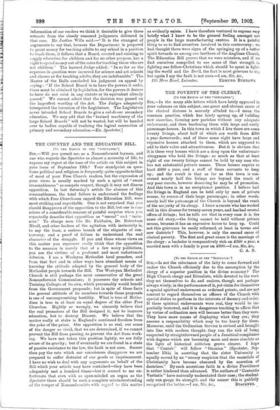[TO THE EDITOR OF THE "SFEcrAToR."1 SIR,—IS not the reluctance
of the laity to come forward and endow the Church efficiently due to the assumption by the clergy of a superior position in the divine economy? The High Church clergy and Ritualists, while devoted to the work they set themselves to do, and zealous, though not perhaps always wisely, in the performance of it, yet claim for themselves a special spiritual endowment as ordained priests, and are not content to regard themselves as officers of the Church with special duties to perform in the interests of decency and order. If these spiritual endowments were real, they would be ina partially bestowed, and it is dangerous teaching to affirm that by virtue of ordination men will become better than they:were. They have more means of displaying what they are; they assume a responsibility which may be too heavy for them. Moreover, until the Ordination Service is revised and brought into line with modern thought, they run the risk of tieing suspected by straightforward people of a Jesuitical compliance with dogmas which are becoming more and more obsolete as the light of historical criticism grows clearer. I hope that " Cantab." will follow " Oxonian " (Spectator, ,Sep- tember 13th). in asserting that the sister University is equally moved by an "uneasy suspicion that the essentials of Christianity have become obscured by the accretion of doctrines." By such accretions faith in a divine Providence is rather hindered than advanced. The authors of "Contentio Veritatis " have naturally understated their case; the student only can gauge its strength, and the sooner this is" publicly recognised the better.—I am, Sir, (kc., Dr..acosus..,






































 Previous page
Previous page